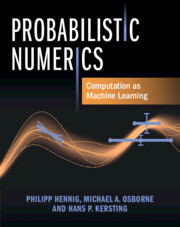Crossref Citations
This Book has been
cited by the following publications. This list is generated based on data provided by Crossref.
De Ceuster, F
Ceulemans, T
Cockayne, J
Decin, L
and
Yates, J
2022.
Radiative transfer as a Bayesian linear regression problem.
Monthly Notices of the Royal Astronomical Society,
Vol. 518,
Issue. 4,
p.
5536.
Pentland, Kamran
Tamborrino, Massimiliano
Sullivan, T. J.
Buchanan, James
and
Appel, L. C.
2023.
GParareal: a time-parallel ODE solver using Gaussian process emulation.
Statistics and Computing,
Vol. 33,
Issue. 1,
Wei, Pengfei
and
Beer, Michael
2023.
Machine Learning in Modeling and Simulation.
p.
341.
Thomson, Sarah L.
Adair, Jason
Brownlee, Alexander E. I.
and
van den Berg, Daan
2023.
From Fitness Landscapes to Explainable AI and Back.
p.
1663.
Ernst, Oliver G.
Sprungk, Björn
and
Zhang, Chao
2024.
Uncertainty modeling and propagation for groundwater flow: a comparative study of surrogates.
GEM - International Journal on Geomathematics,
Vol. 15,
Issue. 1,
Farooq, Ahmad
Galvis-Florez, Cristian A.
and
Särkkä, Simo
2024.
Quantum-assisted Hilbert-space Gaussian process regression.
Physical Review A,
Vol. 109,
Issue. 5,
Flores‐Tlacuahuac, Antonio
and
Fuentes‐Cortés, Luis Fabián
2024.
A data‐driven Bayesian approach for optimal dynamic product transitions.
AIChE Journal,
Vol. 70,
Issue. 6,
Matsumoto, Tadashi
and
Sullivan, T. J.
2024.
Images of Gaussian and other stochastic processes under closed, densely-defined, unbounded linear operators.
Analysis and Applications,
Vol. 22,
Issue. 03,
p.
619.
Porcu, Emilio
Bevilacqua, Moreno
Schaback, Robert
and
Oates, Chris J.
2024.
The Matérn Model: A Journey Through Statistics, Numerical Analysis and Machine Learning.
Statistical Science,
Vol. 39,
Issue. 3,
Cross, Elizabeth J.
Rogers, Timothy J.
Pitchforth, Daniel J.
Gibson, Samuel J.
Zhang, Sikai
and
Jones, Matthew R.
2024.
A spectrum of physics-informed Gaussian processes for regression in engineering.
Data-Centric Engineering,
Vol. 5,
Issue. ,
Zabel, Susanne
Hennig, Philipp
and
Nieselt, Kay
2024.
VIPurPCA: Visualizing and Propagating Uncertainty in Principal Component Analysis.
IEEE Transactions on Visualization and Computer Graphics,
Vol. 30,
Issue. 4,
p.
2011.
邹, 志鹏
2024.
Predicting the Elastic Modulus of Normal and High-Strength Concrete Based on Machine Learning.
Modeling and Simulation,
Vol. 13,
Issue. 03,
p.
2591.





